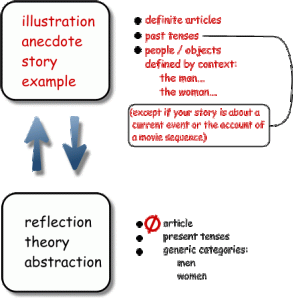I once heard a missionary give a talk about all of the amazing things happening on his mission field. He said people were experiencing a lot of personal healing. He said there were worship services where the Holy Spirit was clearly present. He told us their leaders were growing incredibly.
It sounded like a lot of great things were happening. But that’s it. He hinted at a lot of great stories, but he didn’t tell any of the stories.
“Amazing things are happening” is nice to report, but what does it mean? If amazing things really are happening, pick out the one or two most amazing stories, and tell them. If leaders really are growing incredibly, choose one of those incredible stories of growth and tell it.
I believe that missionary was telling the truth. And I think he really wanted us to know the truth and be excited. But he had become so accustomed to hearing and giving reports full of generalities and clichés that he missed a great opportunity to invigorate a crowd of supporters. I doubt anyone left that day to tell other people, “You should hear about this amazing mission.” Because they didn’t have any picture in their minds of what it looked like. There was nothing to tell.
For preaching and testimony
Preachers –– want to improve your preaching? Search your sermon manuscript for broad, abstract statements. Then replace them––or at least complement them––with something concrete: nouns that you can touch and verbs that you can see.
I say that as an off-the-charts abstract thinker. The concrete world is often unreal to me. My wife wrapped my Christmas presents in front of me two years in a row without me knowing. So this doesn’t come naturally, nor do I always get it right. But when I make the effort, I see the benefits. People retell my stories. They rarely retell my abstract statements. (For the record, I’m referring to real stories here, not the ones you find in 101 Sermon Illustrations.)
The same applies when you share your testimony. Describe it as if you were narrating a short video. Phrases like, “I was lost and directionless” don’t bring images to people’s minds. Compare that to the testimony of a cop who says, “I told everyone I was okay… and then I flipped my car on an on-ramp, beat a suspect unconscious, got suspended… but I was ‘okay.'”[1. a quote adapted from The Thomas Crown Affair, 1999] The first one hints at a story, the second one tells the story.
For conferencing
For my United Methodist friends, what if a few simple tweaks could change how we think about our conferencing?
What if we never again heard from the conference floor, “Now we’ll hear a report from our camps committee”? And instead we heard, “I want you to hear a great story from one of our camps.” What if we solicited the very best stories from across our conference, chose four to eight of them, and told them with gusto? (My conference is doing some of this. We’re hearing more stories and less reports. We’re already halfway there!)
With not much more than that, we could change our whole approach to Annual Conferences. We could sell tickets.
I know this because I just attended something similar. I paid several hundred dollars and drove to Washington, D.C., for the International Justice Mission (IJM) Prayer Gathering. They work in thirteen different countries with a $47 million budget. During their main sessions, I heard four stories. A drop in the bucket compared to all that they do. But I left inspired and invigorated. I began recruiting others to go to next year’s Prayer Gathering. I began conversations about how our church could give to their work.
This is a classic case of “less is more.” Lots of reports and statistics were available to us––2,668 people freed from forced labor slavery in India, 18,900 people trained in violent crime detection and prevention––but what made it all real to me was the story of four young girls being rescued from an Indian brothel. I didn’t hear about the similar work being done in Cambodia, the Dominican Republic, and the Philippines, but I didn’t need to. That single rescue story was much more important for me than hearing generalities about rescues happening across the world.
What if our Annual Conferences took a cue from these? Worship, tell our best stories, and pray together. Sell tickets and turn it into a rally. What if United Methodists from across the conference looked forward to that annual gathering and went home telling others they had to go? What if they left excited about “paying apportionments” (local church funds given to the conference) because they stopped viewing them as “dues” and started viewing them as contributions to mission? (As for the 2-3 hours’ worth of actual business and essential reporting, we could move those into a special delegates-only session.)
Our opportunities to share are precious. How are you using yours? Are they inspiring, making believers, giving people something they’ll remember and maybe even retell? Next time you catch yourself saying, “Great things are happening” or talking about “healing” or “transformation” or “forgiveness” or “life change,” ask what the specific stories are behind those general statements.
————-

One thought on “Don’t tell about a story, tell a story”